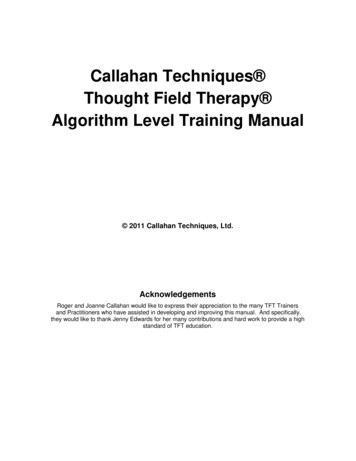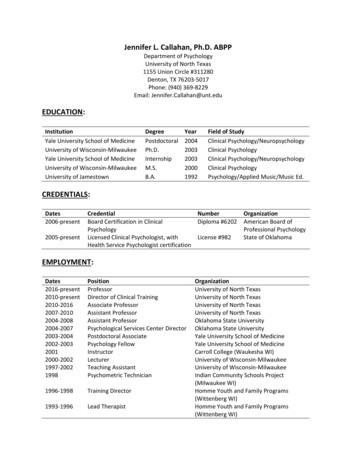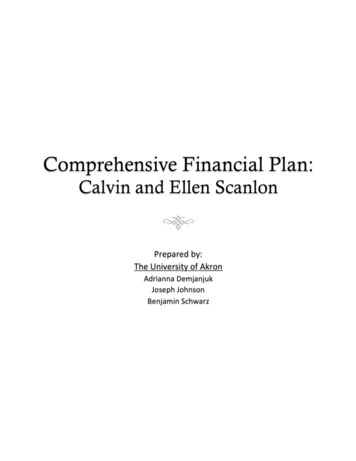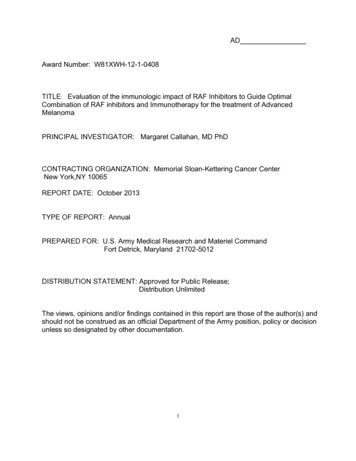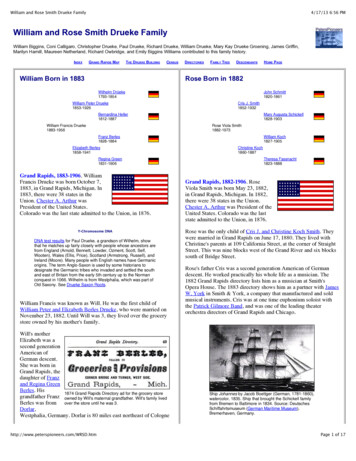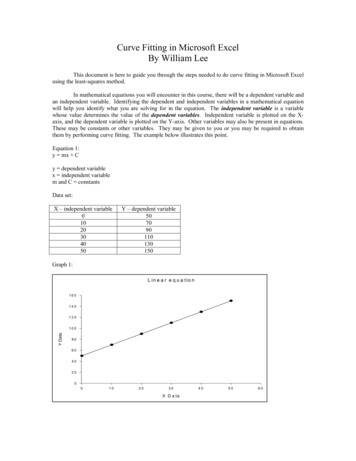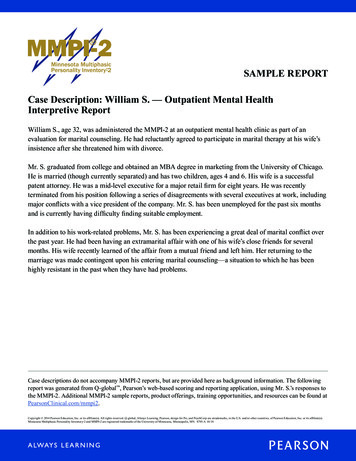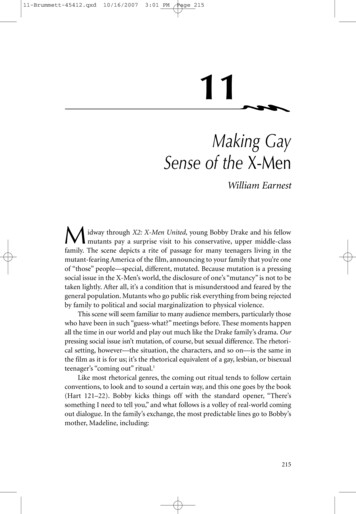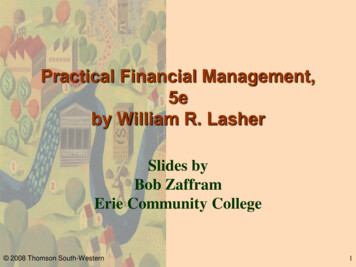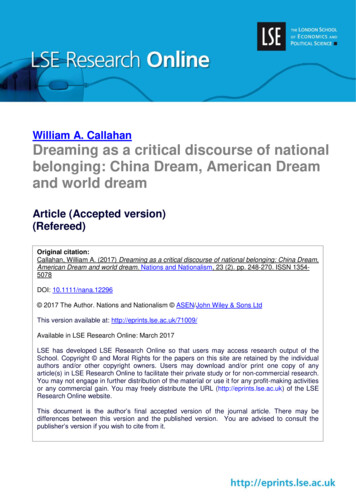
Transcription
William A. CallahanDreaming as a critical discourse of nationalbelonging: China Dream, American Dreamand world dreamArticle (Accepted version)(Refereed)Original citation:Callahan, William A. (2017) Dreaming as a critical discourse of national belonging: China Dream,American Dream and world dream. Nations and Nationalism, 23 (2). pp. 248-270. ISSN 13545078DOI: 10.1111/nana.12296 2017 The Author. Nations and Nationalism ASEN/John Wiley & Sons LtdThis version available at: http://eprints.lse.ac.uk/71009/Available in LSE Research Online: March 2017LSE has developed LSE Research Online so that users may access research output of theSchool. Copyright and Moral Rights for the papers on this site are retained by the individualauthors and/or other copyright owners. Users may download and/or print one copy of anyarticle(s) in LSE Research Online to facilitate their private study or for non-commercial research.You may not engage in further distribution of the material or use it for any profit-making activitiesor any commercial gain. You may freely distribute the URL (http://eprints.lse.ac.uk) of the LSEResearch Online website.This document is the author’s final accepted version of the journal article. There may bedifferences between this version and the published version. You are advised to consult thepublisher’s version if you wish to cite from it.
1William A. Callahan, ‘Dreaming as a Critical Discourse of NationalBelonging: China Dream, American Dream, and World Dream’, Nations andNationalism (2017) 23(2):248–270. DOI: 10.1111/nana.12296.William A. Callahan is professor of international relations at the London School ofEconomics and Political Science. His books, articles, and films explore identitypolitics and nationalism in China, the US, and Asia. He can be reached atW.Callahan@LSE.ac.uk.AbstractThis article explores the normative politics of national belonging through ananalysis of the ‘China Dream’ and the ‘American Dream’. It traces how politiciansand public intellectuals employ such slogans to highlight how national dreamsemerge in times of crisis, and involve a combination of aspirations and anxieties.It compares parallel rhetorical strategies—‘patriotic worrying’ in China and theAmerican Jeremiad in the US—to examine how belonging to these two nationsinvolves a nostalgic longing for the past as a model for the future. Debates aboutthe meaning of these national dreams highlight the tension between freedom andequality in the US, between the individual and the collective in China, andbetween longing for the true nation, and belonging in the actual nation for bothcountries. It concludes that while this quest for redemption through past modelslimits opportunities for critical discourse in China, the American Dream stillcontains much ‘promise’. The China Dream and the American Dream thus are, atthe same time, 1) familiar expressions of nationalism and national belonging, and2) ongoing self/Other coherence-producing performances that help us toquestion received notions of nationalism and national belonging.Key words: China, America, dreaming, nostalgia, critical theory
2Dreaming as a Critical Discourse of National Belonging:China Dream, American Dream, and World DreamThe rise of China has complicated the way we think about global politics. In2015, Beijing challenged the Western-led world order first diplomatically throughinstitution-building, and then militarily through island-building: Beijing launchedthe Asia Infrastructure Investment Bank, a new multilateral institution thatchallenges the World Bank, and then built military bases on top of coral reefs inthe South China Sea to challenge neighboring countries and the US (French2015; Callahan 2016).It is easy to understand institution-building and island-building in terms ofmaterialist international relations theories: liberal institutionalism and offensiverealism (Ikenberry 2012; Mearsheimer 2014). What is often missing fromdiscussions of the rise of China is the ideational challenge posed by Beijing: howdoes the rise of nationalism, and identity politics more broadly, shape domesticand international politics in China? Since the end of the Cold War, there hasbeen a shift from grand ideologies that universally apply to ‘humanity’—such ascommunism—to ideas and identities that are more local, national, and regional.Indeed, often we don’t talk about ‘liberal democracy’ as an ideology available toall, but analyze comparative and international politics in terms ‘Westerndemocracy’ that may not apply to other regions. Huntington’s (1996) vision ofworld politics as a ‘clash of civilizations’ is an example of this trend, whereidentity takes shape in relation to ‘difference’. Following the critique of
3cosmopolitan universals seen in the epigraph of Knott’s ‘Introduction’ to thissection on ‘Nationalism and Belonging’—‘But of course not everyone belongs’(Spiro 2007: 3)—identity politics here defines the self against the Other in orderto narrate the nation (see Connolly 1991: 64; Bhabha 1990). The rise ofnationalism in China—against some negative idealization of the West/America—has been an important part of this oppositional trajectory of national belonging.Hence most analyses frame the rise of China in terms of a challenge to theWest, where Beijing replaces Washington as the capital of the world, and China’sharmonious civilizational values replace Western democratic values (Jacques2009; Kang 2007; Katzenstein 2012; Rozman 2013). This article takes a differenttrack to compare parallel nationalist discourses in China and the United States:the China Dream and the American Dream. Following the ‘Nationalism &Belonging’ focus of ASEN’s 2014 annual conference, this paper will examine howbelonging in China and the US involves a nostalgic longing for the past as amodel for the future. Rather than take identity and membership for granted asfixed or stable entities, the article examines how national belonging is the productof very active and ongoing political and moral debates among political leaders,popular culture, and public intellectuals. It will show how the national belongingevoked in these two national dreams can lead to the socialization of ideals, andthus to a belonging that is constrained by the nation. It also highlights hownational dreams can invoke belonging beyond domestic space: both the ChinaDream and the American Dream have active constituencies far beyond theirnational territories—and not just among expatriate or diaspora communities.
4Rather than taking the ‘nation’ for granted as an essential identity or anactor in a rational calculus, it is helpful to see the nation as a set of unstablesocial relations that take on coherence through cultural governance (Shapiro2004). Cultural governance here looks to Foucault’s (1991) understanding ofpower as a productive force that is generated by social relationships, rather thanas a set of juridical practices that restrict action. Shapiro (2004:34) argues thatwhile for the early-modern state, sovereignty relied on ‘military and fiscalinitiatives’, by the nineteenth century these ‘coercive and economic aspects ofcontrol have been supplemented by a progressively intense cultural governance aimed at making territorial and national/cultural boundaries coextensive.’ ButShapiro (2004:49) does not simply chart out the productive power of state-ledcultural governance; his critical approach also shows how resistance to restrictivenational identity can emerge through other modalities of expression—film,theater, television, novels and other counter-nationalist or alternative-nationalistnarratives—that ‘challenge the state’s coherence-producing writingperformances.’Rather than enter into the grand debate about whether nationalismprecedes nations (or not) (see Gellner 1982, Smith 1986a, Armstrong 1982), Iwould like to explore the contingencies of national belonging by employing a setof concepts, rather than arguing in terms of a set of ideologies. Here I followAnderson (1991: 5), who suggests that it would ‘make things easier if one treated[nationalism] as if it belonged with “kinship” and “religion,” rather than with“liberalism” or “fascism”.’ But rather than looking to nationalism studies’
5established list of concepts—language, kinship, religion, and geography, forexample (see Renan 1990)—I am interested to see how more modestconcepts—the ‘American Jeremiad’ and ‘patriotic worrying’ [youhuan yishi]—canhelp explain national belonging as a coherence-producing performance in the USand China (more below). This follows from interesting work done on the power ofaffect and emotion on national identity construction, especially the role ofnostalgia in national belonging (see Muro 2005; Armstrong 1982; Smith 2015;Murphy 2009).By framing analysis in terms of a suspicion of grand narratives (i.e.nationalism as ideology), self/Other relations, and the contingent dynamic ofcultural governance/resistance, this study employs a poststructuralist approachto the normative politics of national belonging. Rather than measuring‘nationalism’ through public opinion survey research, it seeks to interpret identitypolitics through discourse analysis. It focuses on texts by political leaders notbecause they are ‘true’, but because they are influential. While as commander-inchief the US president wields considerable hard power, presidential discourse isexplored in this article because of the soft power value of the White House as a‘bully pulpit’. The discursive power of the Chinese president is even stronger (seeBrady 2008). Likewise, the article looks to popular culture—the China Idol singingcontest, for example—not because it reflects true identity or opinion, but becauseit is wildly popular in terms of viewership and commentary. Chinese people arebuying into the China Dream by consuming nationalism in particular ways (seeCallahan 2010). Public intellectuals hence are interesting because they mediate
6between the official power of the state (i.e. presidential speeches) and theinformal power of popular culture (i.e. television shows): in China, publicintellectuals are important because they are close advisors to the party-state,while at the same time drumming up support for their ideas in online media andtelevision talk shows (see Callahan 2013). Hence, this article chooses texts notaccording to their content (i.e. interesting ideas), but according to their popularityin official and popular arenas. In this way, what we might otherwise dismiss as‘propaganda’, now becomes meaningful information that provides a sense of thedebates that animate the normative politics of national belonging in China (Pieke2009; Swaine 2012:1-2). This article thus shifts from an empiricist explanationthat relies on a truthful representation of the facts, to a poststructuralistunderstanding that relies on persuasive interpretation (Shapiro 2013, pp. 29-30;Bryman 2012, pp. 26-32). Indeed, this interpretive approach is how Chinesescholars engage with official discourse: they look for patterns in order to addmeaning to vague official declarations (see Xu and Du 2015).Lastly, it might seem odd that I am employing methods developed to studyChinese discourse, which is often very vague, repetitious, and unwieldy, toanalyze the American Dream as well. Since the discourse of ‘exceptionalism’animates normative debates about national belonging in both China and the US(more below), it is common for Americanists and Sinologists to analyze theirtopics in isolation. This article deliberately juxtaposes two well-analyzed topics—nationalism in authoritarian China and democratic America—to trace outconnections, similarities, and differences. But rather than starting out from the
7American case, and analyzing China in terms of liberal values and methods, I dothe opposite: start from the Chinese case, to see what the debates that producedthe China Dream can tell us about the normative politics of national belonging inthe People’s Republic of China (PRC), as well as in the US.National DreamsThe China Dream became very popular after November 2012 because XiJinping, China’s new leader, invoked it has his defining slogan: the ‘China dream’is for the ‘great rejuvenation of the Chinese nation’ (Zhonggong 2013:3). Rightaway there were many comparisons with the American Dream, which also has apresidential pedigree. Barak Obama’s (2004; 2006) two books even have ‘dream’in the title: Dreams From My Father and The Audacity of Hope: Thoughts onReclaiming the American Dream. Indeed, Obama’s life itself presents anexample of the American Dream writ-small: an outsider who gains fame, fortune,and status through hard work.Such national expressions of dreams characteristically posit an essentialnational identity, which is often dismissed as propaganda: the ‘myth’ of theAmerican Dream (Hodgson 2009; Noble 2007; Owen 2002). Others look to thedark side of American history—slavery and militarism—to tell us that theAmerican experience is better described as a nightmare (Bacevich 2009;Hodgson 2009; Murphy 2009: 136; Nobel 2007). Curiously, many of the critics ofthe American Dream also adopt an essentialized unitary view, where theAmerican Dream is either completely true, or completely false; totally virtuous or
8totally sinful. Many English scholars, in particular, seek to prove that theAmerican Dream is false—a myth that is a poor copy of ‘European’ values(Hodgson 2009; also see Bercovitch 2012: 9-10).But such efforts to ‘disprove’ the American Dream miss the point. A myth isnot simply a falsehood; as Aristotle told us, a myth is ‘made up of things towonder at’ (cited in Madsen 1995: 227). The American Dream and the ChinaDream thus are not facts to be proven or disproven, but moral narratives thatexpress a nation’s aspirations and anxieties in poly-vocal conversations aboutthe good life, civilization, and progress (Madsen 1995: 209-10; Murphy2009:135). Rather than denouncing or mocking such dreams, as do manyscholars and public intellectuals, we should take them seriously as a way ofthinking about how national belonging takes shape through debates aboutvalues. Attention to such dreams can help us see how nations are an ongoingcoherence-producing performance that both includes and excludes variousgroups (see Butler 1993).As suggested above, the issues here are both theoretical and empirical.They are empirical in the sense that we need to conduct a thick description of theChina Dream (because it is quite recent), and of the American Dream (because itis so enduring). Rather than affirming essentialist singular national identities, I willargue that dream discourse grows out of vigorous normative debates aboutnational belonging. These debates highlight the tension between freedom andequality in the US, and between the individual and the collective in China. Moregenerally, they highlight the tension between longing for the true nation, and
9belonging in the actual nation. As we will see, such dreams erupt not merely indomestic space: they now are going global in the soft power politics of arewarmed Cold War battle between the China Dream and the American Dream.Analyzing the normative politics of national belonging through anexamination of national dreams is also a theoretical project. The dreams don’tmerely reflect the reality of a society—they are positioned as interventions toredirect debate as part of a critical practice. Rather than empirical measurementsof truth or falsity, they involve intersubjective political judgments of normativevalues—which often then are repackaged as truth claims about the authenticnation (Murphy 2009:132-5). The article thus explores how the American Dreamgrows out of the particular rhetoric of the ‘American Jeremiad’, and how theChina Dream grows out of the peculiar Chinese practice of ‘patriotic worrying’.‘Jeremiad’ comes from the OId Testament, and looks to the story whereJeremiah declares ‘Return, O faithless people’ (Jeremiah 3:22) to Jews who hadabandoned the covenant sworn at Sinai. The American Jeremiad fuses thesacred with the secular to argue that the country has problems because itlikewise has lost its way. To solve the problems America needs to reaffirm itscovenant to American ideals, especially as outlined in the sacred texts of theDeclaration of Independence and the Constitution. The American Jeremiad thuscombines a sacred covenant with a worldly mission, which through the AmericanDream has now become a mission to the world (Bercovitch 2012; 1978; Murphy2009:126).
10In China, ‘patriotic worrying’ [youhuan yishi] presents a similar backwardlooking discourse. This ‘patriotic worrying’ gives intellectuals the moral obligationto frame problems and solutions in terms of China’s national and civilizationalperfection. Intellectuals feel that it is their job to ponder the fate of the nation, andto find the correct formula to solve China’s problems. Once the correct formula isdiscovered, then China will be rejuvenated and take its rightful place at the centerof the world (Davies 2007; Bøckman 1998).As we will see, neither the American Dream nor the China Dream aresimply positive jingoistic celebrations of the nation. Alongside the celebrationthere is always a lamentation about missed opportunities and lost greatness(Bercovitch 1978; Murphy 2009). Part of belonging to these national communitiesthus involves an intense longing for past glory (see Muro 2005; Smith 2015).Indeed, in 2013 Chinese President Xi Jinping declared that his China Dream wasfor the ‘great rejuvenation of the Chinese nation’, while Donald Trump’s 2016president campaign slogan was ‘Make American Great Again’. National dreamsthus are not just a celebration of success, but a response to a crisis: politicalcrisis, economic crisis, and cultural crisis—which are all framed as a moral crisis.The article’s conclusion thus will consider the limits of these two criticalinterventions: rather than Chinese and American Dreams looking forward to apluralistic future, both the American Jeremiad and Chinese ‘patriotic worrying’aim to get their nations back on the straight-and-narrow path that leads tonational perfection. To put it another way, it will consider how ‘critical’ does notnecessarily mean progressive. As we will see, values-talk in both China and the
11US is dominated by broadly conservative ideals: the family, the collective, andorder. The goal of the national dream is national perfection rather than theuniversal emancipation of humanity. This, once again, shows how the normativepolitics of national belonging differs from cosmopolitan evocations of solidaritythat prescribe universal belonging.The China DreamOn 29 November 2012, China’s new leader Xi Jinping told us that his ‘Chinadream’ is for the ‘great rejuvenation of the Chinese nation’. He later explainedthat to ‘fulfill the China Dream of the great rejuvenation of the Chinese nation, wemust achieve a rich and powerful country, the revitalization of the nation, and thepeople’s happiness’ (Zhonggong 2013: 3, 5). Although it is easy to dismiss suchslogans as propaganda, they are crucial in organizing thought and action inChinese politics (Pieke 2009; Swaine 2012:1-2). Famous communist poet AiQing (1982: 302)—who is now better known as artist-activist Ai Weiwei’s father—reflected this understanding of language and politics in a poem he wrote forChairman Mao in 1941: ‘The new slogan determines the new political direction’.Here we will examine Xi Jinping’s official book about the China Dream(Zhonggong 2013) and his later book The Governance of China (Xi 2014a), andrelate these speeches to how other policymakers and opinion-makers nowinvoke this phrase.China Dream discourse is mostly about domestic politics; it asserts acertain vision of Chinese national identity, but it is more complex than that. It
12promotes an unwieldy combination of individual dreams for the good life, andcollective dreams for a wealthy and powerful nation: including the military dreamof China overtaking the US as the next superpower (see Liu 2010; Callahan2013). Figures 1 and 2, both of which come from Summer 2013, illustrate theparameters of China Dream discourse. Figure 1 shows a boy band ofmetrosexual youth singing at the ‘Voice of the China Dream’ televisionprogramme (which is modeled on ‘American Idol’). They are pursuing individualdreams of fame and fortune by hamming it up to the camera as individuals.Figure 2 shows seamen lined up on the deck of China’s first aircraft carrier tospell out ‘the China dream is a strong military dream’. These butch guys are notacting as individuals: we can’t even see their faces. Hence they exemplify thecollective dream of national strength, especially when compared with the ChinaDream’s internationalist element: the boy-band singers are actually from SouthKorea.Figure 1: ‘Voice of the China Dream’ contest
13Figure 2: ‘China Dream is Strong Military Dream’ (CCTV 2013)However, the two figures are not examples of cultural governance andresistance: both the ‘Voice of the China Dream’ singing contest and the navaloperation are part of Beijing’s official propaganda campaign (see ZhonggongBeijing 2013; Xinhua 2013). These examples show how the China Dream hasbeen recruited into an on-going conversation about Chinese values, and aboutwho belongs in the Chinese nation. But it’s more than simply propaganda: whenXi introduced the China Dream concept in November 2012, he actuallyrecognized that ‘everyone has their own ideals and aspirations, and all have theirown dream. Now, everyone is talking about the China Dream’ (Zhonggong 2013:3). Xi’s China Dream thus is part of a broad and ongoing debate about the moralcrisis that China faces after three decades of economic reform and opening. Inother words, China’s New Left, traditionalists, militarists and liberals are allworried about the ‘values crisis’ presented by what they call China’s new ‘moneyworship’ society (Hu 2011; Xu 2011; Liu 2010; Yan 2013). Intellectuals fromacross the political spectrum thus have a crisis mentality and engage in whatDavies (2007:1) describes as ‘patriotic worrying’:
14Worrying about the problems that prevent China from attainingperfection, not only as a nation but also as an enduring civilization, isthe kind of patriotic sentiment that one commonly encounters in theessays of Chinese intellectuals.Competing voices in civil society thus invoke the China Dream to respond to thisvalues crisis in many different ways (see Callahan 2013; Liu 2010).Xi’s invocation of the China Dream in 2012 was his intervention into thisdebate in civil society. This new slogan is meant to determine China’s newpolitical direction, and to provide the correct formula that will generate a sense ofnational belonging in China, and will lead to China’s perfection as a nation and asa global civilization.‘The China Dream, The Dream of Constitutionalism’, the 2013 Ne wYear’s editorial of the Southern Weekend newspaper (Nanfang Zhoumo),challenged Xi’s narrow vision of China’s future in interesting ways. It usedthe same ‘China Dream’ slogan to call for legal limits on the power of theparty-state. It argued that the quest for human dignity ‘cannot possibly endwith national strength alone; it must include self-respect for every person. We will continue to dream until every person, whether high official orpeddler on the street, can live in dignity’. The editorial thus concluded that‘the real “China Dream” is a dream for freedom and constitutionalgovernment’ (Dai 2013). Unfortunately, this editorial was censored, andthen rewritten by the provincial propaganda chief to endorse a nationaldream of strong state power.
15But in another way this invocation of China Dream discourse was aneffective act of resistance; this state censorship generated considerableprotest from journalists in China. It then sparked a lively debate in the widerpublic about the rule of law in the PRC, which continued into 2016. Indeed,it provoked China’s leadership to make the rule of law the main theme atthe annual meeting of the Central Committee of the Chinese CommunistParty (CCP) in October 2014. This then is a prime example of how thecultural governance of the China Dream can provoke resistance by makingdebates veer off into unpredictable directions. While not leading directly topolitical reform, this constitutional debate certainly made the party -statefeel the need to publicly defend what it means by the ‘rule of law’ and whatit means by the ‘China Dream’.Xi’s invocation of the China Dream thus is responding to a ‘crisis’ in statepower that runs parallel to the values crisis in civil society: a crisis of politicallegitimacy in the rapidly changing social situation that is the result of China’srapidly growing economy. Although from the outside China may look confident,internally many of its leaders are uneasy; as it fulfills its grand aspirations, Chinasimultaneously encounters nagging political, social, and economic uncertainties.According to both officials and public intellectuals, China is in an ‘era of strategicopportunity’. The stakes are high—if Beijing misses this great opportunity to fulfillthe China Dream of the great rejuvenation of the Chinese nation, then many feelthat the PRC risks total failure: ‘If China in the twenty-first century cannot become
16world number one, cannot become the top power, then inevitably it will become astraggler that is cast aside’ (Liu 2010: 9).Xi thus promotes the China Dream as a ‘composite ideology’ to address awide array of opportunities and risks (Smith 1986b:83ff). It is full ofcontradictions, but that is not necessarily a weakness. As a composite ideology,the China Dream it is able to encompass both individual dreams of happinessand collective dreams of national strength. Rather than point to socialism as auniversal ideology that promises liberation, the China Dream looks to what FrankPieke calls ‘neo-socialism’. Since the CCP shifted from being a revolutionaryparty to a ruling party in 2000, there has been much ideological work to legitimatecontinued party rule. As Pieke (2009:11) explains,under neo-socialist rule, the communist utopia has been replaced by atechnocratic objective of a strong, peaceful and modern China that isalmost synonymous with strong, effective and forward-lookinggovernment. Socialist ideology is no longer the end served by theCommunist Party rule, but the mere means by which party rule isperpetuated.In this way progressive universal ideologies can be nationalized—as did DengXiaoping in the early 1980s with ‘Socialism with Chinese characteristics’. Xi’sChina Dream thus looks to China’s unique national identity: the China Dreammobilizes the Chinese Spirit to follow the Chinese Path (Zhonggong 2013).Xi Jinping’s China Dream has coopted the language and arguments ofmany public intellectuals in the military and the New Left. China’s liberals,
17however, are largely excluded from this new coalition. Individual dreams of aneconomic and social ‘good life’ are encouraged—but as we saw with the debateover constitutionalism, dreams of individual political rights and liberties thatchallenge the party-state are discouraged. Belonging in the Chinese nation islikewise hierarchical: people who challenge the collective path to the ChinaDream are less favored than those who follow it.Chinese views of the American DreamMany discussions of the China Dream in the PRC actually start with theAmerican Dream (Zhou 2011: 2; Liu Yazhou in Liu 2010: 1; Zhao 2006; Brady2008: 5; Wang 2013a; Hu 2013a; Shi 2013), which should not be surprising sincethe American Dream is a global discourse. One scholar even stated that onlygreat powers like China and the United States ‘dare to have national dreams’(Shi 2013). But the China Dream is usually discussed as a challenge to theAmerican Dream. For example, just before Xi Jinping went to the US to meetBarak Obama in June 2013, the CCP’s official newspaper the People’s Dailyexplained the ‘Seven Major Differences between the China Dream and theAmerican Dream’ in terms of China’s collective dream of national wealth andpower, and Americans’ dreams of personal freedom and happiness (Shi 2013).China here is defined as a nation united in its virtuous pursuit of global power,while America is portrayed as a collection of individuals bent on their own selfishschemes.
18Xi Jinping reinforced the Cold War geopolitical framing of the ChinaDream at the ‘Beijing Forum on Art and Literature’ in 2014 when he praised ayoung blogger, Zhou Xiaoping, for spreading ‘positive energy’. Zhou (2013) ismost famous for his discussion of the China Dream as a rich alternative to whathe calls the ‘Broken American Dream’. Official commentators thus can concludethat the American Dream as a whole is a ‘failure’ because not every singleAmerican has been able to achieve their individual dream (Xu 2013:127).The point of China Dream policy thus is not only to tell people what theycan dream, but more importantly, what they cannot dream: many individualdreams, the constitutional dream, and the American Dream (Wang 2013b).Although he does not point directly at the American Dream, Xi Jinping toldjournalists from BRICS (Brazil, Russia, India, China, and South Africa) that China‘can’t follow other countries’ development models’ (Zhonggong 2013: 27). Ascholar fleshed out this point in the Global Times: ‘We do not dream the dreamsof other countries, especially not the American Dream. The American modelcauses great harm’, and thus is a bad example for China (Wang 2013a).This coherence-producing performance of national belonging aims toconvince people that Chinese values are not only different from American values,but are the opposite: Chinese values are good, while American values are evil(Tian 2013). Many commentators, including liberal intellectuals like Hu Shuli,argue that China and the United States are involved in a Cold War-style contestof the American Dream
National Dreams The China Dream became very popular after November 2012 because Xi Jinping, China’s new leader, invoked it has his defining slogan: the ‘China dream’ is for the ‘great rejuvenation of the Chinese nation’ (Zhonggong 2013:3). Right away there were many comparisons w
